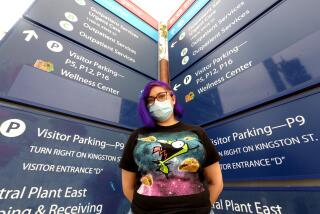Sudden KPC Clinic Closings Catch Many Patients Off Guard
Mark Vitello was supposed to find out Monday whether or not he had diabetes.
But when the San Fernando Valley resident arrived for his appointment at the Mulliken Medical Group clinic in Chatsworth, he was turned away. The clinic, owned by KPC Medical Management, was closed, an office worker told him curtly, and the company shut down. Someone would call him about his test results.
âI went to the chart room and the lady said, âItâs closed. Weâre not in business anymore,â â said Vitello, an emergency medical technician. âUnfortunately, I have to start all over.â
It was a theme echoed throughout the day as doctors and patients looked for answers in the wake of Sundayâs decision by KPCâs owner, Dr. Kali Chaudhuri, to shut down the business, which provided care for about 252,000 people as of Monday.
Dave Griffin had driven to the companyâs Westminster clinic from Midway City in Orange County after administrators phoned to say that his sonâs Dec. 9 tonsillectomy had been canceled.
He was greeted by a sign on the door: âNo appointments will be seen today. For medical emergencies, call 911.â
âItâs not fair,â Griffin said.
The closing of the groupâs 38 clinics across Southern California marked the poignant end of a long journey for some of the stateâs most venerable medical practices. KPC comprised some of the nationâs original managed-care practices, medical groups started in Los Angeles in the 1920s as a way to provide affordable health care to working people.
In the 1990s, the former MedPartners Inc. bought about 100 clinics, including those owned by Friendly Hills and Mulliken medical groups, descendants of Los Angelesâ venerable Ross-Loos clinics, thinking there was big money to be made in Californiaâs growing market for managed care.
Under MedPartners, which has since changed its name to Caremark Rx, the clinics became the largest single for-profit medical group management company in the state, serving a million patients.
But the business model was flawed. MedPartners and similar companies acted as middlemen, contracting with health plans to provide care for their patients in exchange for a set monthly fee. MedPartners crashed in 1999, its once highflying stock down to less than $10 a share and care for its members at risk of disruption.
State regulators took over in 1999, thrust a subsidiary of the company into bankruptcy and sold 72 of the clinics to Chaudhuri, who named the enterprise KPC Medical Management.
With agreements from health plans and even the former owners in place to help stabilize the company, Chaudhuri was convinced he could make the enterprise work. But the clinics were losing $10 million a month--more than he originally thought--and by late last year, KPC had stopped paying the thousands of doctors who provided specialty care to the companyâs patients. The company also stopped paying suppliers of wheelchairs, oxygen tanks and other supplies.
The company closed 30 clinics, laid off doctors and made a plea to regional health plans for more money.
In September, the health plans agreed to bail out the company, providing loans of about $30 million and increasing the monthly fees. But for reasons that remain unclear, KPC was again $20 million in the red by November and had stopped paying doctors.
On Sunday, company President Donald Smallwood said KPC would be closed.
The company said it plans to file for protection under Chapter 11 of the U.S. bankruptcy code today or Wednesday, said KPC general counsel Bill Thomas.
Behind the scenes, accusations flew on Monday between doctors, health plans and the company, all with different ideas about what went wrong. The California Medical Assn. accused the health plans of deliberately putting KPC out of business by delaying bailout payments and yanking patients out of the group.
The health plans said they did pay, and that patients had to be moved to ensure their safety as KPC continued to struggle.
But all of that seemed beside the point to patients seeking care at KPC clinics.
âIt sure is a mess. They donât give you any notice,â fumed Garden Grove resident John Halvorson at the KPC clinic on Magnolia Boulevard in Westminster. âIâm here to get my blood pressure pill and itâs not âoptional.â â
Although he didnât get to see his personal physician--there was none on duty--a clinic worker gave Halvorson his prescription. But there was no one to fill out the paperwork to have the pills covered by his insurance, so he paid $22 out of pocket for half of the prescribed pills.
Throughout the day, health plan representatives, along with those few KPC employees who showed up even though they hadnât yet been paid, directed patients to emergency rooms or to new doctors. In all, KPC has about 2,000 employees.
All health plans with members in KPC have been ordered by the state to place newspaper ads with phone numbers for patients to call if they need care. And all of KPCâs patients will receive letters from their health plans with the name of a doctor to whom their medical records will be forwarded. Patients preferring a different doctor should call their HMO.
*
Times staff writer Ofelia Casillas contributed to this report.
More to Read
Sign up for Essential California
The most important California stories and recommendations in your inbox every morning.
You may occasionally receive promotional content from the Los Angeles Times.










